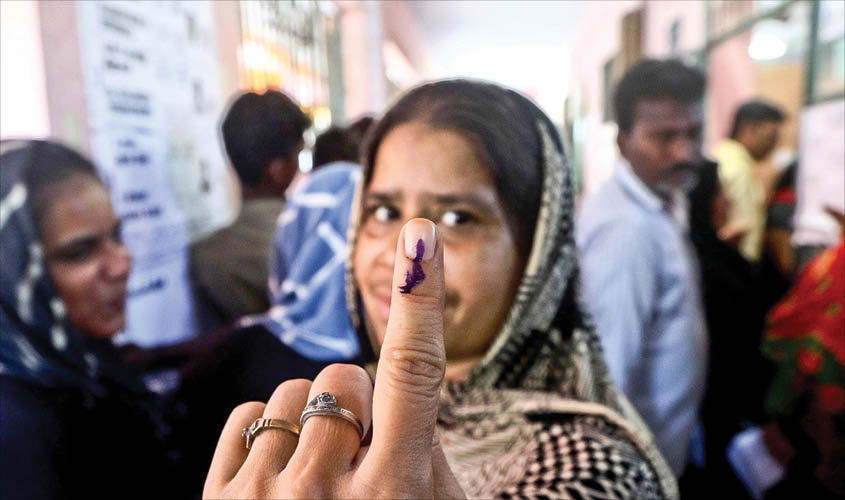Here, it’s a battle between AIADMK, DMK, MNM and AMMK.
New Delhi: On 18 April, for the first time in 40 years, Tamil Nadu voted in the absence of two stalwarts who dominated the state’s Dravidian politics for over four decades. This is going to be the most decisive factor in this Lok Sabha election for the two frontrunners in this southern state, the Dravida Munnetra Kazhagam (DMK) and its rival All-India Anna Dravida Munnetra Kazhagam (AIADMK).
Without “Kalaignar” Karunanidhi and “Puratchi Thalaivi” Jayalalithaa, electioneering in Tamil Nadu had lost its sharpness, charm and vigour. While Karunanidhi’s son M.K. Stalin along with the Congress, CPM, CPI and five other regional parties formed the Secular Progressive Alliance, Amma-less AIADMK headed by current Chief Minister Edappadi Palaniswami opted to be part of the BJP-led National Democratic Alliance, which, some say, is going to be suicidal for the party.
While how these two parties perform in the elections without their towering mentors will decide the future of Tamil Nadu politics, two hitherto unknown factors may influence the final outcome of this election, results of which will be known in a few days. Those two factors are actor-turned politician Kamal Haasan and Jayalalithaa’s one-time favourite T.T.V. Dhinakaran, with their fledgling political outfits, Makkal Needhi Maiam (MNM) and Amma Makkal Munnetra Kazhagam (AMMK) respectively. Both pulled huge crowd at their rallies in select parts of the state, and many political observers believe that Dhinakaran will definitely prove to be a spoilsport for the AIADMK. Between them, they are expected to mop up a least 20% of the vote share. And interestingly, both Kamal Haasan and Dhinakaran are using this election as a launch pad for future political actions, though Dhinakaran has had his electoral baptism back in 1999, when he won a Lok Sabha seat on an AIADMK ticket from Periyakulam constituency and was a Rajya Sabha member between 2004 and 2010.
As part of BJP’s “Southern Push”, Prime Minister Narendra Modi flew in six times, addressing rallies in different parts of the state. He was followed by many national leaders of the party, but its over-dependence on AIADMK may turn out to be counterproductive. In a way it cuts both ways. An alliance with BJP at this point of time, when there is an anti-Centre feeling running across the state, can be disastrous for the AIADMK.
There is a feeling among the cadre that the present leadership had caved in to the pressure tactics of the BJP and “betrayed” Amma, who would never have had any truck with the Hindutva party had she been alive, a constant reminder to ardent Jayalalithaa followers by Dhinakaran and company. Stalin has only added fodder to this by posing a defiant anti-Modi stance and went out of his way to accommodate Congress, which in no way deserves the ten seats given to it by the DMK. With no Modi wave in Tamil Nadu, it was the turn of Congress president Rahul Gandhi to create one such in favour of his party.
Congress’ leadership thought that by making Rahul Gandhi contest from Wayanad, the so-called trijunction, bordering the states of Karnataka, Tamil Nadu and Kerala, the party could bolster its chances in the southern belt. His presence in the South may have helped the Congress in Kerala, but it has not created any ripple effects either in Tamil Nadu or in neighbouring Karnataka. By contesting from a constituency in Kerala where BJP has no presence whatsoever, the Congress president had, in a way, sent out wrong signals regarding his party’s intent in taking on the Sangh Parivar at the national level. But it is immaterial since Stalin had projected Rahul Gandhi as an alternative to Narendra Modi and hence it was no surprise that he drew large cheering crowds at most of his rallies. In a way these elections will see the revival of Congress party from its deathbed in Tamil Nadu.
With 37 seats, AIADMK was the second largest opposition party in the outgoing Lok Sabha. Jayalalithaa had won as many seats without any alliance and against all odds. There was no doubt in her lifetime she had nursed ambitions of being Prime Minister of the country some day. There are many who believe that had she been alive, Jayalalithaa would have been a strong contender for the Prime Minister’s chair in Delhi, more than Mayawati or Mamata Banerjee. She had the charisma to combat Narendra Modi at the national level. That is one of the main reasons why Tamils at large, excluding the upper caste Brahmins, would not forgive the present AIADMK leadership for so meekly surrendering to the “Hindi speaking and divisive-minded” politicians of the North. The anti-BJP sentiments are strong in Tamil Nadu. It is only a question as to who gets to reap the benefits. It will be someone who cares for the interests of the state, who can take up the issue of NEET, of Cauvery waters and suicide of farmers, to make Tamil Nadu stronger. National parties have no such role to play in this Dravidian soil.

